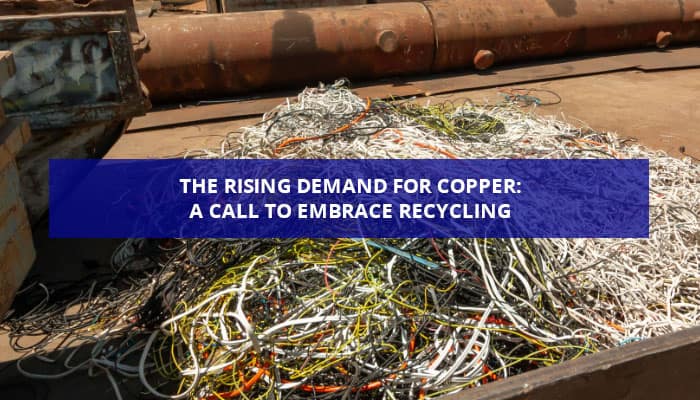In today’s interconnected world, copper stands as a vital cornerstone, woven intricately into the fabric of modern life. Its significance spans across industries, from powering our homes and businesses to enabling the latest technological innovations. However, beneath its ubiquity lies a looming challenge: the growing scarcity of its natural resources. In this exploration, we delve into the complexities of why copper is experiencing such high demand and advocate for the imperative of embracing recycling as a sustainable solution to this pressing issue.
Understanding the Unwavering Appeal of Copper
Copper’s allure lies in its remarkable properties that make it indispensable across various sectors. With exceptional conductivity, it serves as the backbone of electrical wiring and infrastructure, facilitating the transmission of power over vast distances with minimal loss. Its malleability and ductility make it ideal for shaping into intricate components, crucial in industries ranging from construction to electronics. Moreover, its corrosion resistance ensures durability, guaranteeing the longevity of infrastructure and products alike.
The Driving Forces Behind Copper’s Surge in Demand
Several interconnected factors contribute to the escalating demand for copper on a global scale. The burgeoning renewable energy sector heavily relies on copper for its transmission and distribution systems, as renewable sources such as solar and wind require extensive wiring infrastructure. With the increasing emphasis on sustainability and the transition towards cleaner energy sources, the demand for copper is poised to skyrocket in the coming years.
Furthermore, rapid urbanisation and industrialization, particularly in emerging economies, fuel the appetite for copper-infused infrastructure. As cities expand and modernise, the need for reliable electrical grids, efficient transportation networks, and telecommunications systems intensifies, driving up the demand for copper-based solutions.
Moreover, the digital revolution, characterised by the proliferation of smartphones, computers, and other electronic devices, perpetuates the demand for copper. These gadgets, replete with copper components, contribute significantly to its consumption as technology continues to advance at a rapid pace.
The Environmental Imperative: The Case for Embracing Recycling
In the face of mounting demands and dwindling natural resources, the imperative to embrace copper recycling becomes unequivocal. Recycling not only alleviates the strain on finite natural resources but also presents a myriad of environmental benefits. By recycling copper, we reduce the need for environmentally destructive mining practices, thereby mitigating habitat destruction, water pollution, and soil contamination associated with extraction activities.
Furthermore, recycling consumes less energy than extracting virgin copper, leading to a substantial reduction in greenhouse gas emissions. According to estimates, recycling copper requires only 15% of the energy needed to mine and extract copper from its ores, making it a significantly more sustainable alternative.
Challenges and Opportunities in Copper Recycling
Despite its numerous benefits, copper recycling faces its own set of challenges. Chief among these is the lack of awareness and infrastructure surrounding recycling processes. Many individuals and businesses remain unaware of the importance of recycling copper or are deterred by perceived complexities and logistical hurdles.
Moreover, the economic viability of recycling is often hindered by fluctuating market prices, making it challenging for recycling facilities to operate profitably. Additionally, logistical constraints, such as transportation and sorting, further complicate the recycling process and can deter potential recyclers.
However, amidst these challenges lie abundant opportunities for innovation and collaboration. Governments, businesses, and individuals alike can play a pivotal role in fostering a culture of recycling and sustainable resource management. Investment in recycling infrastructure, coupled with incentives for businesses to adopt sustainable practices, can catalyse the transition towards a circular economy.
Contact Allied Metal Recyclers
Take the first step towards sustainability today. Contact Allied Metal Recyclers to learn how you can contribute to the circular economy and make a positive impact on our planet. Together, let us pave the way towards a greener, more prosperous tomorrow.



